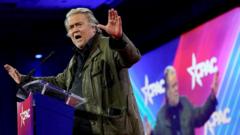The recent election of Pope Leo XIV, born Robert Francis Prevost in Chicago, has led to a notable divide among supporters of former President Donald Trump, highlighting the increasingly prominent role of Catholicism in American politics. While Pope Leo holds the distinction of being the first American pontiff, key figures within Trump's Make America Great Again (MAGA) movement have expressed their disappointment, asserting that he does not embody an "America first" philosophy.
Pope Leo's political views remain largely elusive, although he has previously raised concerns about social issues, particularly regarding immigrants and the poor. His choice of name may suggest alignment with more progressive church leadership, and he seems to have supported Pope Francis's stance on certain issues, including immigration—a point of contention for Trump's supporters. Trump himself characterized Leo’s appointment as a "great honour" for the United States; however, many within the MAGA circle are worried about what this election may mean for their agenda.
Notably, Steve Bannon, Trump's former chief strategist, openly criticized the new Pope, citing his previously vocal objections to American senior politicians as likely precursors to future tensions between the Vatican and the White House. Furthermore, Pope Leo's brother, John Prevost, indicated that the new Pope would likely speak out against the Trump administration, particularly regarding its immigration policies.
Polling suggests that approximately 20% of Americans identify as Catholic, with a significant majority leaning towards the Republican Party. Yet, this demographic spectrum includes varying degrees of belief systems and expectations, as seen historically with past Catholic Presidents John F. Kennedy and Joe Biden, who represented opposing political parties. The complexities within the Catholic community are underscored by the fact that a substantial majority of American Catholics align with views that diverge from current Church doctrines, particularly regarding issues like abortion and immigration.
In Chicago, reactions to the newly elected Pope reveal a mix of hope and disappointment among local Catholics. Some expressed a desire for Pope Leo to continue the more progressive agenda set by his predecessor. The U.S. Conference of Catholic Bishops welcomed the election, celebrating it as a moment for unity among Catholics while acknowledging the broader implications of leadership priorities.
Despite the small size of the MAGA subset within the larger Catholic community, their voices resonate significantly within conservative media. On platforms associated with Bannon, criticisms flowed regarding Pope Leo, with various commentators positioning him as an ally of liberal ideologies and an adversary to Trump’s conservative policies.
The narrative surrounding Pope Leo's political inclinations continues to evolve as analysts scrutinize his social media activity, which appears to reflect past criticisms of Trump’s administration particularly around immigration strategies. The Pope’s stance towards immigration is currently uncertain, but indications of tension between conservative values, as espoused by right-wing commentators, and the new Papal leadership may have consequences for both the Catholic Church and American politics at large.
As the political landscape shifts, Vice President Mike Vance weighed in with the notion that matters concerning the Pope should not be politically laden, emphasizing the importance of prayer and support for universal Catholicism despite differing opinions.
The unknowns regarding Pope Leo's teachings on LGBTQ matters further complicate perceptions. Conservative commentators are split, with calls for observation rather than immediate judgments remaining persuasive among some factions of American Catholics. Nonetheless, many MAGA supporters have already labeled him as “anti-Trump,” prompting concerns about possible diverging paths between the Vatican and the White House.
With Pope Leo XIV now in office, the ramifications of his beliefs and statements will undoubtedly shape not only his papacy but also the relationship between the Catholic Church and American political factions in the years to come.




















